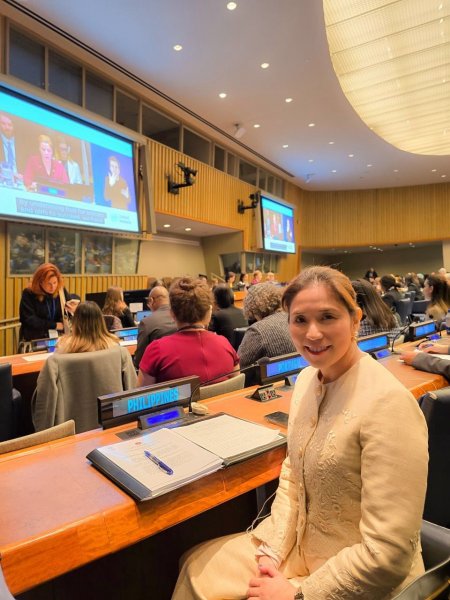

NEW YORK CITY, United States — As Head of the Philippine Delegation at the 68th Annual Commission on the Status of Women (CSW68), Department of Budget and Management (DBM) Secretary Amena “Mina” F. Pangandaman delivered the Philippines’ statement on Tuesday, March 12, 2024, at the First Ministerial Roundtable at the United Nations Headquarters in New York City.
As the largest annual event on gender equality and women’s empowerment, CSW fosters critical dialogue among governments, civil society organizations, experts and activists from around the world, focusing conversations on the actions and investments needed to eradicate women’s poverty and defend equal rights for all genders.
CSW’s work includes a series of ministerial-level roundtables, each focusing on a different topic but focused on this year’s priority theme: “Accelerating the achievement of gender equality and the empowerment of all women and girls by addressing poverty from a gender perspective and strengthening institutions and resources.”
The first Ministerial Roundtable (MRT) focused on policies and strategies to eradicate poverty, and mobilize resources for gender equality and the empowerment of all women and girls.
“The Philippines remains a partner in contributing to poverty eradication, promoting gender equality, and empowering all women and girls as reflected in the Philippine Development Plan 2023-2028 and the Gender Equality and Empowerment of Women (GEWE) Plan 2019-2025,” DBM Secretary Pangandaman said during the first MRT.
In her address, Secretary Pangandaman highlighted numerous initiatives led by the Philippine government to promote gender mainstreaming, including the 1995 Gender and Development (GAD) Budget Policy, or “Women’s Budget,” which was enacted for the implementation of projects and programs focused on GEWE. The law is supported by the Magna Carta of Women and consistent guidelines for preparing annual plans, budgets, and achievement reports for GAD.
The Budget Secretary also noted that 24 percent of the Philippine government’s 2022 budget was used to implement gender-sensitive initiatives covering women’s empowerment and gender equality and to integrate gender-sensitive components into flagship programs.
Among the concrete measures highlighted at the meeting was the Pantawid Pamilyang Pilipino Program (4Ps), a conditional cash transfer program that currently benefits 4.4 million households and promotes access to education and health services, financial inclusion, and the empowerment of women and girls.
“this [4Ps] “Our budget in 2008 was only $5.37 million, but has grown to $1.9 billion by 2024. Graduates of this program will also undergo the Kilos-Unlad program to ensure they do not fall back into poverty,” Pangandaman explained.
Another programme highlighted was the Small and Medium Enterprises Skills Upgrading Programme which supports the vision of a gender-sensitive Micro, Small and Medium Enterprises (MSMEs) sector.
“Budgeted at $1.33 million for 2023, [Small Enterprise Technology Upgrading Program] “We have created 3,348 jobs for Filipino women. Relatedly, 68 percent of those who availed MSME loans from the Small and Medium Enterprise Corporation were women entrepreneurs,” the DBM Secretary elaborated.
“This further supports our findings that Filipino women are more financially engaged than their male counterparts in terms of account ownership, savings and credit indicators,” Pangandaman added.
She also mentioned scholarships being offered in the Philippines from secondary to graduate levels to combat gender poverty by promoting science-based education. The grants aim to increase the number of female graduates pursuing careers in science, technology, engineering and mathematics.
In the health sector, Pangandaman noted that a significant portion of the Philippine budget is dedicated to ensuring the health and nutrition of pregnant and lactating women. The funds are monitored through a gender budget tagging initiative and are directed towards providing culturally appropriate and gender-sensitive socio-economic services.
“[The Philippine Government] “We recently signed the UN Sustainable Development Cooperation Framework for 2024-2028, which prioritizes joint initiatives for human capital development, inclusiveness and building resilience,” she concluded.
Tara Thomas Agency stands at the forefront of the entertainment industry, with years of experience dedicated to nurturing the most exceptional talents and successful acts.